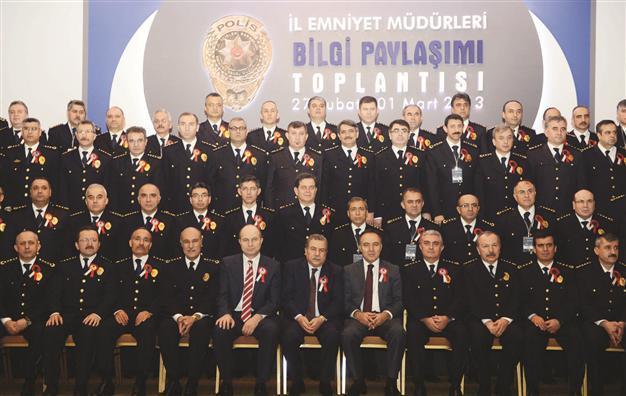Turkish interior minister warns police about ‘provocations’ in peace process
ANKARA/ANTALYA

Interior Minister Muammer Güler (first row, C) poses with provincial police chiefs at a gathering in Antalya. Minister Güler says ‘provocations’ should be avoided during the current peace process.
The ongoing process aimed at eventually finding a peaceful resolution to Turkey’s decades-old conflict with the Kurdistan Workers’ Party (PKK) is vulnerable to “sabotages” and “provocations,” Interior Minister Muammer Güler said on Feb. 27, but stressed that democratic and legal tools must be used against such attempts.
“Against those aspiring to sabotage this process, we will all together give the required response by using the language of democracy and law,” Güler said, delivering a speech at a meeting held in Antalya where police chiefs from Turkey’s 81 provinces were gathered. He emphasized that the process was aimed at putting an end to terror.
The police department has a big responsibility for the process to be successful and for improvement of the societal success, he added.
“Throughout the latest process, provocative violent incidents have been drawing attention. That’s why precautions should be improved against groups who might try to create an environment of conflict and to sabotage the process. Provocations should not be allowed,” Güler said.
Counterterrorism efforts Pointing to the relations between the ongoing process and counterterrorism efforts, Güler, who replaced hawkish İdris Naim Şahin as part of a minor Cabinet reshuffle in late January, highlighted that counterterrorism efforts should be exerted with respect to the principles of the rule of law and human rights.
“This process is not a process throughout which the law is suspended. It is a process that aims at strengthening national unity and fraternity,” he said.
As part of the process, a delegation of Peace and Democracy Party (BDP) parliamentarians recently visited jailed PKK leader Abdullah Öcalan, who handed them a letter, with three addressees on separate cover letters: the BDP, Kandil - where the PKK’s headquarters and training camps are based - and the European wing of the PKK.
In Ankara, speaking in an interview with private NTV news station on Feb. 27, Deputy Prime Minister Bülent Arınç referred to the content of the letters, saying that Öcalan had called on the PKK militants to halt attacks as of March 21, at Nevruz – a spring festival for many people in the Middle East that is of particular significance to Kurds. Öcalan also wants the PKK to lay down its arms around July and August and to then start withdrawing from Turkey, Arınç said.
In a brief message conveyed by the BDP delegation on Feb. 23, Öcalan suggested that the PKK could release some government officials and soldiers it has captured.
“I believe [the captive soldiers and officials] could be returned to their families, but this is not a matter that can be used for bargaining,” Arınç said.
